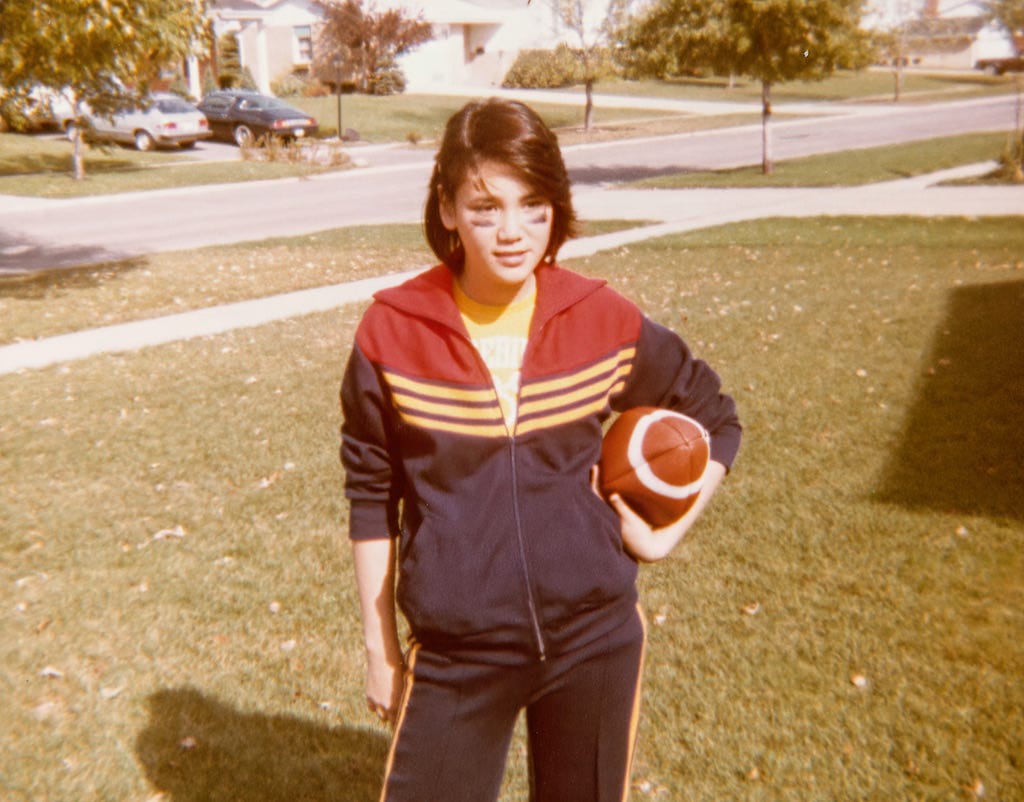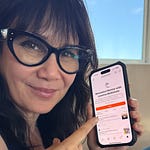I’ve recently had a huge epiphany: I’m not for everyone. 😲 As a recovering people pleaser, this was big news to me because I’ve long held the mistaken belief that I could pretzel myself into being pleasing to all. I know, it's crazy and crazy-making.
For example, when I was in sixth grade and had the growing realization that I did not fit into any group, I joined the volleyball team, learned how to play basketball and ran track - even though I’m not an athlete and am not wildly coordinated. 🤦 But I looked around and saw that adults responded well to the sports kids, and those kids on sports teams always seemed to be having a good time. So I put my love of books on the back burner and laced up my gym shoes. (That’s what us mid-westerners call sneakers.)
It was definitely fun to be a part of a team, but I never lost the “lone wolf” energy. I always felt like I was on the periphery looking in, and that no one really got me. So there was an odd juxtaposition of having a good time and also feeling the pain of not belonging. As a result, I would try too hard to be a part of the group by bringing cupcakes to practices or doing stupid stuff like putting my entire fist in my mouth to get attention. I was quick to raise my hand to volunteer and at the same time I tried not to say anything, for fear of saying the wrong thing.
Over the years, I became so adept at people-pleasing that I dis-connected from the ability to know what I wanted. At one point in my twenties, when I was in the process of getting a divorce from my first husband, I went to the grocery store to stock up the fridge and cupboards in my new tiny studio apartment. I was in the cereal aisle and I had no idea what cereal to buy. All I could think about was how my ex liked Cap’n Crunch, which I didn’t, but I would eat it anyway. Such a simple thing. Breakfast. And I had no clue.
Despite not knowing what I wanted for breakfast, I double-downed on people pleasing because it served me well in the workplace. I was rewarded for not knowing my own needs and saying yes to any request, and anticipating the needs of others.
A few years after I was fired from my CBS gig, I started to work on identifying what I wanted. It felt wildly uncomfortable and I had feelings of guilt and shame when I would state a want like: My daughter’s birthday is coming up so I’ll be leaving early. Or, I’m going to work from home in the morning to avoid traffic. Or, Could I be cc’d on emails related to this project that I’m overseeing?
The last several years, I’ve become much much better at catching my people-pleasing tendencies, but I never had an affirmation that helped me navigate the slippery slope. Until, last week when I attended a six day retreat in Ojai - it’s one that I do on an annual basis (except of course when the world is in lockdown). It’s led by Heidi Rose Robbins, a gifted poet and astrologist, and you can learn more about it on her website heidirose.com.
This “I’m not for everyone” epiphany came out of literally sitting with the discomfort of being a “lone wolf” who people pleases in order to become a part of community. It’s so important to your well-being to not run from what makes you uncomfortable. Rather, get curious by journaling, taking a walk with your thoughts, talking it out with a trusted advisor or friend or therapist or coach or mentor. Through the curiosity, you can find what’s underneath the pain point and get to the longing. And when you identify the longing, then you can course correct to find ways to have that need or want met.
So here are some questions to help the people-pleaser achieve their goals:
🤷 The first question the people pleaser has to ask is: is this goal truly mine, or does it belong to someone else? As people-pleasers, we may trick ourselves into thinking that the goal belongs to us so we can make someone else happy.
🤷 If the goal is truly yours, who are you displeasing in pursuing and achieving that goal? The hard truth is that your goal may be upsetting to someone for a variety of reasons: jealousy, desire to spend more time with you, conflicting values, etc. To state the obvious, being dis-pleasing is triggering to the people-pleaser so we may stop ourselves from pursuing what we really want, for fear of being judged negatively.
🤷 As you get closer to achieving your goal, you may begin to feel shame or embarrassment because you are putting yourself first vs. someone else. It is very very difficult for the people-pleaser to make themselves a priority.
The hard truth is that I am not for everyone, and everyone is not for me. In accepting this truth, I have the freedom to listen to my wants and needs and that guides me to identifying my true, authentic goals. And while I will face obstacles and challenges in achieving those goals, I’m able to move through them with more ease because I am connected to my authenticity.
Let’s start with a simple, but not easy, question: Whose goals are you pursuing?

I love to support ambitious, driven people who are feeling stuck and want to regain momentum so they can hit their next big goal. Want to explore working together? Check out my website.
If you’re resonating with what you’re reading, please consider subscribing. What’s that mean?
🙌🏾 Updates on offerings, free stuff, recommendations, referrals.
🙌🏾 You’ll receive regular emails (with lots of heart and a bit of humor) that share a tool or insight from my coaching practice.
🙌🏾 Typically the email will have a question at the end to provoke thought that supports you in your growth.















Share this post